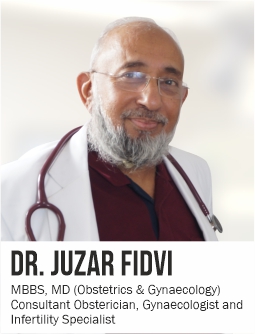
DEPARTMENT OF GYNAECOLOGIST AND OBSTETRICAL
DEPARTMENT OF GYNAECOLOGIST AND OBSTETRICAL


VIMS Hospital provides complete and personal Gynaecologist and Obstetrical care for women at every stage. We have one of the Best Gynaecologists and Obstetricians on panel. Our multidisciplinary team of doctors and nurses, all work to provide international quality care. We are committed to the highest quality of patient care and safety.
At VIMS, we offer diagnostic, consultative, and therapeutic services offered to all obstetrical and gynecological problems to patients from all strata of society.
Our comprehensive services include
Gynaecology Division (Gynaecologist and Obstetrical)
With integrated support from expert radiation oncologists( in Collaboration) team, VIMS Gynaec. The oncology unit provides a multitude of services ensuring compassion and the best care for patients with cancer problems in their reproductive system.
Our patients benefit from treatment by a highly experienced, multidisciplinary team skilled in both medical and surgical gynaecologic diagnosis and therapies.
- Adolescent gynaecological care (11-18 years)
- Family planning & contraception services
- Reproductive endocrinology and infertility treatment
- Pre-menopause & post – menopause services
- Urogynecology and pelvic reconstructive surgery
- Minimally invasive gynecologic surgery service
- Gynaecologic oncology
Obstetrics Division
- Birthing Centre
- High-Risk Pregnancy unit
General and Preventive Gynaecological care
- Sexually transmitted infection (STD) screening (for both men and women)
- Mammosonography
- Gynaecologic and obstetric ultrasound
- Tubal patency test
- Hormonal studies
- Annual examinations (pap testing, breast cancer screening, contraception, menopause/hormones)
- Endoscopy including hysteroscopy
- Colposcopy
- HPV testing & vaccination
Infertility treatment.
TREATMENTS FOR FEMALE INFERTILITY(Gynaecologist and Obstetrical)
- Medication Treatments for Female Infertility
- Surgical Treatments for Female Infertility.
If surgery is required for fertility treatment, either conventional open surgery or keyhole surgery may be offered
The following types of surgery are performed for treating various fertility problems:
- Unblocking the fallopian tubes
- Adhesiolysis-Freeing adhesions
- Treating polycystic ovary syndrome (PCOS)
- Treating mild endometriosis
- Removal of fibroids
- Sterilization reversal
Peri-Menopause & Post Menopause Services at VIMS Hospital(Gynaecologist and Obstetrical)
As women complete their families, we provide counseling and therapeutic management for mid-life women in the peri-menopause and post-menopause periods.
Our services include:
- Breast Cancer risk assessment
- Cardiovascular risk assessment and advice
- Hormonal and menstrual disorders
- Use of bio-identical hormone therapy
- Medical treatment of urinary incontinence
- Sexual dysfunction
- Vulvar and vaginal disorders
- Osteoporosis prevention and treatment
- Nutrition and exercise to minimize health risks
Urogynecology and pelvic reconstructive surgery(Gynaecologist and Obstetrical)
The problems with the laxity of pelvic muscles can be very distressing to a woman. Childbirth, constipation, obesity, respiratory problems, and other conditions can weaken the pelvic muscles. In advanced cases, the upper section of the vagina or portions of the pelvic area drops into the vaginal canal. Too often, women don’t seek medical care because they are embarrassed, or don’t realize treatments can help.
- Urinary frequency & urgency
- Recurrent urinary tract infections
- Overactive bladder syndromes
- Pelvic organ prolapse (dropped bladder, vagina, uterus, or rectum),
- Vaginal Fistulas, diverticula and vaginal agenesis
Minimally invasive gynaecologist surgery service at VIMS (Gynaecologist and Obstetrical)
We provide innovative care including laparoscopic, same-day surgery as well as trans-cervical procedures to treat patients. Certain gynecological conditions are now treated with less invasive surgical procedures. The Minimally Invasive Gynecologist Surgery Service (MIGS) of VIMS offers treatment options for women with benign gynecologist disorders through the use of laparoscopy and hysteroscopy.
The following conditions can potentially be treated with minimally invasive gynaecologist surgery:
- Investigation and treatment of pelvic pain
- Uterine fibroids
- Uterine fibroid embolization (UFE)
- Suspension surgery (pelvic organ prolapse repair)
- Endometriosis
- Adenomyosis
- Tubal ligation – both laparoscopic and hysteroscopic procedures
- Endometrial ablation
- Abnormal uterine bleeding
- Laparoscopic removal of the uterus or ovary
- Removal of ovarian cysts
Benefits of minimally invasive gynaecologist surgery
- Can be done on an outpatient basis
- Faster recovery
- Minimal post-operative discomfort
- Less blood loss
- Less likelihood of infections
- Faster return to normal activities
- Can improve or maintain fertility
Gynaecologist oncology
With integrated support from expert radiation oncologists( in Collaboration) team, VIMS Gynaec. The oncology unit provides a multitude of services ensuring compassion and the best care for patients with cancer problems in their reproductive system.
Treatment of specific gynaecologic cancers includes:
- Cervical cancer
- Endometrial/uterine cancer
- Ovarian/fallopian tube cancer
- Vaginal cancer
- Trophoblastic disease / molar pregnancies
- Pre–invasive conditions/dysplasia of the cervix or vulva
Birthing Centre at VIMS Hospital (Gynaecologist and Obstetrical)
A woman’s life is considered to be complete with the birth of a baby. Expecting or planning for a baby can be a wonderful time for the family. Whether you are welcoming your first baby or your third, we know childbirth is a significant milestone for you, your baby, and your loved ones. We know every woman’s childbirth is different. Our expert team is prepared day and night to handle all situations – from overseeing normal deliveries to managing high-risk or even emergencies.
We also provide care in the Medical & Surgical Termination of Pregnancy, including Management of Miscarriage and Foetal Anomaly.


Our patients have ready access to –
- preconception consultation
- Complete obstetric care for single and twin pregnancies from conception through delivery to postpartum care
- High and low-risk deliveries
- Vaginal deliveries
- Cesarean deliveries
- Vaginal birth after prior cesarean delivery
- Genetic counseling
- Prenatal diagnostic options include comprehensive and targeted ultrasounds, first-trimester screening, chorionic villus sampling, amniocentesis, and percutaneous umbilical blood sampling, among others.
Why choose VIMS for your childbirth experience?
It is because we offer:
- Specialized obstetrician coverage 24X7X365
- Painless labor (epidural analgesia) facilities
- Team of dedicated experts
- In-house neonatologists
Experts in high-risk pregnancy:
High-Risk Pregnancy unit
Care of VIMS maternal-fetal medicine specialist extends from preconception care to specialized prenatal care and intrapartum care, obstetric and medical complications of pregnancy, diagnosis, and management of fetal anomalies, fetal complications, and fetal testing.
Our high-risk pregnancy unit includes
- Obstetrician
- Neonatologist
- Physician and Intensivist
- And well- trained associated staff.
And
Surgeons, cardiologists,s and other specialists, the Intensive care unit (ICU), and all diagnostic facilities are available under the same roof in an emergency.
All work as one unit.
A high-risk pregnancy is one in which some condition puts the mother, the developing fetus, or both at higher-than-normal risk for complications during or after the pregnancy and birth even to the risk of life of either mother or fetus or both.
We manage the full spectrum of high-risk pregnancies, giving comprehensive care. Our expert specialists have extensive experience in the management of the most complex maternal and fetal disorders. Pregnancy is also considered high-risk when prenatal tests indicate that the baby has a serious health problem (for example, a heart defect). In such cases, the mother will need special tests, and possibly medication, to carry the baby safely through to delivery.
Conditions under high-risk pregnancies
OBSTETRIC COMPLICATIONS
- Recurrent pregnancy loss
- Preterm birth prevention
- Asymptomatic (e.g. prior second-trimester loss, possible cervical insufficiency; prior PTB; Mullerian abnormalities; short cervical length; issues related to cerclage, Pessary, progesterone, or other interventions for the prevention of PTB
- Symptomatic (PTL or PPROM) <34 weeks gestation
- Meconium complications
- Malpresentation and malposition
- Shoulder dystocia
- The abnormal third stage of labor
- Placenta accrete, increta, percreta
- Second- or third-trimester vaginal bleeding
- Preeclampsia with severe elements/ eclampsia with HELLP syndrome (a life-threatening pregnancy complication usually considered to be a variant of preeclampsia) or end-organ damage
- Severe postpartum hemorrhage
- Cesarean hysterectomy
- Acute fatty liver of pregnancy
- Amniotic fluid embolism
MATERNAL COMPLICATIONS
- Hypertensive Disorders
- Cardiac Disease
- Congenital heart disease
- Arrhythmias
- Valve disease
- Cardiomyopathy
- Pulmonary hypertension
- Coronary artery disease
- Heart transplant
- Respiratory Disease
- Asthma
- Pneumonia
- Restrictive lung disease
- Pulmonary edema
- Influenza
- Tuberculosis
- Cystic fibrosis
- Obesity
- Endocrinological Disorders
- Addison disease
- Diabetes, insulin-requiring/ dependent
- Thyroid disease
- Parathyroid disease
- Pheochromocytoma
- Gastrointestinal Disease
- Nausea and vomiting in pregnancy; Hyperemesis gravidarum
- Eating disorders
- Intrahepatic cholestasis
- Inflammatory bowel disease (ulcerative colitis; Crohn’s disease)
- Gallbladder disease (cholecystitis, cholelithiasis)
- Pregnancy after liver transplantation
- Pancreatitis
- Wilson’s disease
- Hematologic Diseases
- Maternal anemia and hemoglobinopathies
- Sickle cell disease
- Von Willebrand disease
- Thrombotic thrombocytopenic purpura / hemolytic uremic syndrome
- Care of the Jehovah’s Witness pregnant woman
- Renal Disease (includes renal transplantation)
- Neurologic Diseases
- Seizure disorders
- Headache
- AV malformation/ berry aneurysm
- Multiple sclerosis
- Pseudotumor cerebri
- Myasthenia gravis
- Spinal cord injury
- Diabetes insipidus
- Psychosocial Issues and Abuse
- Smoking
- Alcohol abuse
- Drug abuse
- Depression
- Other psychiatric disorders
- Domestic violence
- Rheumatologic Disorders
- Antiphospholipid syndrome
- Systemic lupus erythematosus
- Rheumatoid arthritis
- Another autoimmune disease
- Thromboembolic Disorders
- Venous thromboembolism and anticoagulation
- Inherited thrombophilia
- Infectious Disorders
- Hepatitis A
- Hepatitis B
- Hepatitis C
- HIV
- Gonorrhoea
- Chlamydia
- Syphilis
- Trichomoniasis
- Group B Streptococcus
- Vaccination concerns
- Pyelonephritis
- Management of wound infection
- Trauma and Critical Care
- Trauma
- Critical care
- Skeletal; Connective Tissue
- Marfan syndrome
- Maternal skeletal dysplasia
- Dermatosis
- Cancer before and during pregnancy
- Non-obstetric abdominal surgery in the current pregnancy
FOETAL ANOMALIES
- Structural abnormalities
- Family history of abnormality
- Aneuploidy or increased risk for aneuploidy
- Teratogen exposure
FOETAL COMPLICATIONS
- Threatened miscarriage (including medical and surgical management)
- Multifoetal pregnancies (including, but not limited to, mono/di twins, mono/mono twins, higher-order multiples; fetal growth restriction of 1 fetus; twin-twin transfusion syndrome; fetal reduction)
- Growth disorders
- Growth restriction
- Macrosomia
- Infections (e.g., Cytomegalovirus, toxoplasmosis, parvovirus, Herpes, varicella)
- Fetal death
- Hemolytic disease (Red cell alloimmunization)
- Neonatal alloimmune thrombocytopenia
- Non-immune hydrops
GYNAECOLOGIC ISSUES RELATED TO PREGNANCY AND THEIR IMPACT ON PREGNANCY
- History of infertility
- The adnexal mass
POSTPARTUM CARE
Postpartum care, breastfeeding, contraception, and complications such as severe hemorrhage, refractory infections, complicated preeclampsia, eclampsia, and difficult post-cesarean complications
- Wellbeing scan-at about 32 weeks of pregnancy
Four-dimensional ultrasound

General and Preventive Gynaecological care
- Sexually transmitted infection (STD) screening (for both men and women)
- Digital Mammography
- Gynaecologic and obstetric ultrasound
- Tubal patency test
- Ovarian reserve tests such as follicle-stimulating hormone (FSH) levels anti-mullerian hormone levels (AMH) & estradiol levels
- Annual examinations (pap testing, breast cancer screening, contraception, menopause/hormones)
- Endoscopy including hysteroscopy & salpingostomy
- Colposcopy
- HPV testing & vaccination
| 20s | Height and weight | Every 3 years |
| Blood pressure | At all appointments; at least once every 3 years, more frequently if high | |
| Cholesterol screening | At least every 5 years, more frequently if it is high | |
| Diabetes screening | Every 3 years for those with risk factors | |
| Chlamydia & STD screening | Once a year for sexually active women up to age 26, and after for those at risk | |
| Glaucoma screening | Every 3 – 5 years for women at high risk, at least once for women with no risk | |
| Melanoma screening | At least every 5 years, no more often than once a year for women at high risk | |
| Breast cancer screening | Clinical breast exam (CBE) every 3 years; Mammography may be recommended for high risk patients | |
| Cervical cancer screening | Pap test / Colposcopy) every 1 to 3 years depending upon risk factors | |
| 30s | Glaucoma screening | Every 2 – 4 years |
| Cervical cancer screening | Pap test every year, or for women at low risk every 3 years after 3 consecutive annual negative results; screening should continue at least until age 70. Colposcopy as needed. | |
| 40s | Diabetes screening | Every 3 years for women with risk factors over 45 years |
| Breast cancer screening | Clinical breast exam (CBE) and mammogram every 1 to 2 years | |
| Colorectal cancer screening | For women at high risk — colonoscopy not less frequently than every 10 years or fecal occult blood test (FOBT) every year and sigmoidoscopy every 5 years | |
| 50s | Blood pressure | At all appointments; at least once each year and more frequently if high |
| Diabetes screening | Every 3 years | |
| Osteoporosis screening | Not more frequently than every 2 years for postmenopausal women with other risk factors | |
| Breast cancer screening | Clinical breast exam (CBE) and mammogram every 1 year | |
| 60s and above | Osteoporosis screening | Not more frequently than every 2 years for women over 65 |
| Glaucoma screening | Every 2-4 years up until age 65, then every 1-2 years | |
| 70s and above | Cervical cancer screening | Pap test/ colposcopy every 1 to 3 years only at patient/clinician discretion or high risk |


